
Transcription
TAFT COLLEGEDENTAL HYGIENE PROGRAMPOLICIES & PROCEDURES
TAFT COLLEGE DENTAL HYGIENE PROGRAMACADEMIC POLICIES AND PROCEDURESAcademic Policies and Procedures Committee:The Academic Policies and procedures Committee reviews petitions regarding academicpolicies and procedures. These petitions include permission to withdraw from a courseafter the deadline, extension of the period for completing work for an incomplete grade,and approval to attempt to receive credit for a course by examination. Informationregarding petitions is available in the Counseling Center.Attendance Requirements:Students are expected to attend all sessions of each class in which they are enrolled. Sinceregular attendance is one of the most important factors contributing to student success incollege work, the student will contribute to his/her own welfare by eliminating allunnecessary absences. Frequent absences will be reflected in the grade.Instructors are responsible for recommending that a student be dropped from a class forexcessive absences. A student is considered to be excessively absent when his/hercommutative absences exceed the total number of hours that the class meets during oneweek.Individual instructors may establish more stringent regulations at their discretion.However, if they do, each student involved is to be given a written notice of explanationby the instructor at the beginning of each semester. Otherwise, the general attendancepolicy applies.Faculty members should give full consideration to excusing students from classes toparticipate in scheduled college activities such as athletics and field trips. The studentmust make arrangements in advance to make up the work to be missed.Students are responsible for officially withdrawing from an class or classes in which theyno longer wish to be enrolled. Non-attendance DOES NOT release the student from thisresponsibility.1
TAFT COLLEGE DENTAL HYGIENE PROGRAMStudent Code of Conduct:Taft College has specified those standards of student behavior which it considersessential to its educational mission and its community life. These regulations aredesigned to represent reasonable standards of conduct. The Student Code of Conductgoverns THE BEHAVIOR OF STUDENTS AND GUESTS ON CAMPUS AND ATCollege sponsored activities. Violations of the code may subject individuals todisciplinary action, which complies with the requirements of due process.The following violations for which students are subject to College discipline include, butare not limited to:1.2.3.4.5.6.7.8.9.Dishonesty, including, but not limited to, cheating, plagiarism, orknowingly furnishing false information to the college;Forgery, alteration, or misuse of college documents, records, oridentification;Obstruction or disruption of teaching, research, administration,disciplinary procedures, or other college activities, including, but notlimited to, its community service functions, or of other authorizedactivities on or off college premises;Physical abuse of any person on district owned or controlled property or acollege sponsored or supervised functions or conduct which threatens orendangers the health or safety of any such person;Use, possession, or distribution of narcotic or dangerous drugs, on districtowned or controlled property or at any college sponsored event;Disorderly, disruptive, lewd, indecent, or obscene conduct or expressionon expression on college owned or controlled property or at collegesponsored or supervised functions;Failure to comply with directions of college officials acting in theperformance of their duties; or failure to identify oneself for just causewhen requested to do so by college officials acting in the performance oftheir duties;Possession or use of alcoholic beverages on district owned or controlledproperty, or at college sponsored events, or appearances on campus or atcollege sponsored events while under the influence of alcohol;Possession or use of unauthorized firearms or other dangerous weapons ondistrict owned or controlled property.Removal must be immediately reported in writing to the President or Vice President ofStudents.2
Academic Honesty:The administration, faculty and staff at Taft College believe that students are entitled tothe finest education that the college can provide. At the same time, a student’sachievement must include the realization that there are standards of academic honestythat must prevail. Each student should exert every effort to maintain these standards.Academic dishonesty is defined by this college as any illegitimate act by any student,such as plagiarism of falsifying documents that would gain that student an advantage ingrading, graduating from the college, or qualifying for entrance into any academicprogram. It is a serious breach of student conduct and will be treated as such byadministrators, instructors, staff members, and students of the college. Penalties for suchconduct, depending on its severity, may range from a simple reprimand to an actionwhich results in expulsion from the college. All flagrant instances of academic dishonestywill be reported to the Dean of Instruction and/or the Dean of Student Services, andappropriate measures will be taken by those officers of the college to correct the problem.Drug Free Campus:At Taft College, is recognized that an academic community is harmed in many ways bythe abuse of alcohol and the use of other drugs. Decreased productivity of members of thecommunity, serious health problems, and strained social interactions are all possibleproducts of such abuse. Problems associated with the illicit use and abuse of substanceshave a pervasive impact upon an academic community and are not associated with asingular socioeconomic group or age level. The processes of education and learning areespecially impaired by alcohol abuse and the use of illicit drugs.The foundation of the philosophy concerning alcohol and drug abuse of Taft College is afirm commitment to an educational program which provides adequate information andcounseling to make informed and responsible decisions concerning the use of anycontrolled substance. The college is committed to a healthy environment for learning andliving.The policy of the Board of Trustees of the West Kern Community College Districtregarding the prohibition against illegal drugs and alcohol for employees reads asfollows:“Illegal drug and alcohol use is highly detrimental to the workplace and to the efficiencyand productivity the district desires to promote. The use, possession, distribution or saleof illegal drugs or alcohol, or being under the influence of drugs or alcohol, is strictlyprohibited while on the district premises, while representing the district on districtbusiness or while operating a vehicle on duty. Violation of this policy will result indisciplinary action, possibly including discharge.”3
Student Grievance Policy:The student is encouraged to pursue academic and occupational studies and other collegesponsored activities that will promote his/her intellectual growth, career aspirations, orpersonal development. In pursuing these ends, the student should be free of unfair andimproper action by any member of the academic community. When a student feels thathe/she has been subjected to unfair and improper action or denied his;/her rights by amember of the academic community, he/she can seek redress according to the followingprocedures. Grievance actions may be initiated by a student against another student, aninstructor, and administrator, or a member of the classified staff.The following actions are grounds for student grievance:Grievance Category #1 – GradingPrejudiced or capricious decision in the academic evaluation of a student’sperformance.Grievance Category #2 - All Other Grievances Except Grading Including But NotLimited To:1.Acts or threats of intimidation or harassment.2.Acts or threats of physical aggression.3.Arbitrary actions or imposition of sanctions without proper regardto due process.4.Violation of student rights and responsibilities,5.Grievances under Title VI of the Civil Rights Act of 1964, Title IXof the Education Amendments of 1972, and Section 504 of theRehabilitation Act of 1973, which prohibit discrimination on thebasis of race, color, national origin, sex or handicap by federallyfunded education institutions.See the Dean of Student Services or the Dean of Instruction for procedures.Smoking on Campus:Because of fire and health hazards involved, the Board of Trustees has established thefollowing smoking regulations: Smoking is prohibited in all buildings, under nocircumstances may wastebaskets or trash cans be used for ashtrays.Nondiscrimination Notice:Taft College does not discriminate on the basis of race, color, national origin, gender,disability, or age in any of its policies, procedures, or practices, in compliance with TitleVI of the Civil Rights Act of 1964 (pertaining to race, color, national origin, sex,handicap, or age. This nondiscrimination policy covers admission and access to, andtreatment and employment in, the college’s programs and activities, including vocationaleducation. Inquiries regarding the equal opportunity policies, the filing of grievances, orto request a copy of the grievance procedures covering discrimination complaints may bedirected to:4
Title IX Coordinator or Section 504 CoordinatorThe college recognizes its obligation to provide overall program accessibility throughoutthe college for handicapped persons. Contact the Section 504 Coordinator to obtaininformation as to the existence and location of services, activities, and facilities that areaccessible to and usable by handicapped persons.Inquiries regarding Federal laws and regulations concerning nondiscrimination ineducation or the district’s compliance with those provisions may also be directed to:Office for Civil RightsU.S. Department of EducationPolicy on Prohibition of Sexual Harassment:Sexual harassment is prohibited by Title VII of the Civil Rights Act of 1964, Title IX ofthe Educational Amendments of 1972, the California Fair Employment and Housing Act,and also by Board Policy of the Trustees of the West Kern Community College District.Asepsis Requirements/Policy:All dental hygiene students are expected to utilize infection control procedures toestablish and maintain the chain of asepsis in accordance with current policies andprotocol in the dental hygiene clinic, radiology and other classes and while utilizingradiology equipment.Critical Errors:Critical errors for each specific Performance Evaluation are listed in Section IIIPerformance Criteria. Students may also receive critical errors in clinic while performingprocedures other than Performances Evaluations. Critical errors can also be given tostudents outside of clinic based on Professionalism.In the event that a student receives a critical error, they will be required to meet with theirfaculty advisor and the director to discuss the critical error. At that meeting, the facultywill make suggestions to prevent such errors in the future.If a student receives 3 Critical Errors in any one semester, or receives an accumulatedtotal of 7 Critical Errors over the course of the 2 year program, they will be dismissedfrom the Taft College Dental Hygiene Program.5
TAFT COLLEGE DENTAL HYGIENE DEPARTMENTRemediation PolicyAcademic RemediationAny dental hygiene student who performs below 75% on any examination while in thedental hygiene program will be issued an Early Alert informing the student of theirsubstandard performance. The course instructor is to issue the form and make comments.The student is expected to sign the form and return it to the Dental Hygiene OfficeManager. The form is then given to Program Director for signature and filed in thestudent’s confidential file.If a second Early Alert is issued to the student for the same course, the student is thenplaced on Academic Probation. Students on academic probation will be notified by theProgram Director. The student is informed that an average score of 75% is required tosuccessfully complete any dental hygiene course. Failure of this course or any otherdental hygiene course could result from dismissal from the Taft College Dental HygieneProgram.During the academic probation period, the student is expected to fulfill the terms of theirprobation as outlined by the course instructor, faculty advisor, and program director. Theterms of the academic probation may include any or all of the following:1. Meetings with the course instructor.2. Meetings with their faculty advisor.3. Meetings with the program director.4. Professional referrals.5. Contracts.6. Other as indicated.Removal from Academic Probation will occur once the student has shown a gradeimprovement to 75% or above in the course.6
Clinical RemediationAny dental hygiene student who fails to complete a minimum of 75% of the designatedRequirements/Performance Evaluations will receive an Incomplete for the clinic course.Any student who fails to fulfill attendance requirements, complete assigned clinicrotations, demonstrates professional behaviors and attitudes will receive an Incompletefor the clinic course.Any dental hygiene student who fails to attain an average of 75% on their Daily ClinicGrade will receive an “F” for the clinic course and be dismissed from the Taft CollegeDental Hygiene Program.Any student who receives an Incomplete for a clinic course will be placed on clinicalprobation. Students on clinical probation will be notified by the Program Director.Students are informed that an average of 75% is required to successfully complete anydental hygiene course. Failure of a clinical course or any dental hygiene course couldresult in dismissal from the Taft College Dental Hygiene Program.During the clinical probation period, the student is expected to fulfill the terms of theirprobation as outlined by the course instructor, faculty advisor, and program director. Theterms of the clinical probation may include any or all of the following:1. Meetings with the clinical instructors.2. Meetings with their faculty advisor.3. Meetings with the program director.4. Professional referrals.5. Contracts6. Deadline to complete Requirements/Performance Evaluations.7. Make up missed clinic rotations or missed clinic days.8. Demonstrate professional behaviors and attitudes.Removal from Clinical Probation will occur once the student has completedRequirements/Performance Evaluations, missed rotations, missed clinics or has shown animprovement in professional behaviors and attitudes and a grade of a “C” will beassigned for the clinic course.7
If the student fails to meet the terms of the Clinic Probation, he/she will be dismissedfrom the Taft College Dental Hygiene Program.BASIC LIFE SUPPORT CERTIFICATIONAll students, faculty and support staff involved in providing direct patientcare must maintain current certification in healthcare providercardiopulmonary resuscitation(CPR) with an Automated External Defibrillator (AED).GUIDELINES FOR PROFESSIONAL APPEARANCEAs a health care professional, it is important that you present your patients and peers witha positive image of those qualities representative of a dental hygienist. Part of this imageis reflected in your personal appearance and dress. Patients often form a first impressionbased on the physical appearance of their clinician and develop more trust in a personwho looks clean, neat and professional. As a dental hygienist, you are also a role modelto other health professionals and members of the community.To assist you in developing an appropriate professional appearance, the followingguidelines have been established and are to be used in the various educational settingsduring your dental hygiene education.CLASSROOMWhile it is important to be comfortable in the classroom, the following attire isconsidered inappropriate in this professional setting:a. Tube tops or halter tops. Thin strap top/camisole styleb. Strapless tops or dressesd. Bare feet or slippersd. Running shorts, or short shorts, or boxer shorts, ande. no facial piercing.Blue jeans are acceptable if clean and in good repair.LABORATORY, CLINIC, RADIOLOGY1. Uniformsa. Laboratory: Lab coats should be worn to each lab sessionb. Clinic: Students wear selected clinic uniforms and lab coats withname pins during all clinic sessions.c. Radiology: Students may wear selected clinic uniforms and a labcoat with name pins.8
2. Personal Hygiene: Each student should be a positive model of personalhealth through oral hygiene and appropriate personal hygiene habits daily.Since some patients are allergic to perfumes or scented preparation, pleasekeep this in mind while in the clinical or radiology setting.3. Fingernails: Fingernails are to be trimmed short enough to be flush with thetop of the finger pad and only clear nail polish may be worn. Fingernails mustbe short in order to apply principles of correct instrumentation and to protectthe clinician from breaks in asepsis due to over-stretched gloves.4. Hair: Hair should be kept clean and neat at all times. Long hair must be upand back. Medium hair must be short enough that it does not fall forward onthe patient and/or obscure the vision of the dental hygiene student.5. Jewelry:a.b.c.The following jewelry may be worn:A plain band for married students, no stones.A watch with a second hand.Modest necklaces and/or small earrings.6. Glasses/Face Shields: Face shields must be worn to protect eyes and facefrom injury while working in the lab. Glasses or face shields will be worn forall intraoral procedures.7. Shoes:a. Laboratory: Closed-toed comfortable shoes are required toprotect your feet from injury if materials are dropped or spilled.b. Clinic: Low heeled, closed toed, white clinic shoes or whiteleather sport shoes (tennis, walking, or running) are required no canvas shoes are allowed.c. Radiology: Clinic shoes or closed-toed comfortable shoes arerequired.8. Hose: White or flesh colored hose, all plain (no designs) may be worn withapproved clinic uniform and clinic shoes.Socks: Knee-high, solid color white or same color of uniform pants may beworn with the approved clinic uniform and clinic shoes. Heavy athletic socks(sweat socks) are not appropriate.9. In the event of cold temperatures in clinic, wear warm underclothing. AT-shirt or turtleneck may be worn under the clinic top, but will not substitutefor a uniform top. The T-shirt/turtleneck must be plain white with no design.9
Taft CollegeDental Hygiene DepartmentDismissal PolicyShould any dental hygiene student fail to successfully complete a dental hygiene coursethey will be dismissed from the Taft College Dental Hygiene Program. A student hassuccessfully completed a course when they have achieved a grade of “C” or better. If astudent receives a grade of “D” or “F”, they will be dismissed from the Taft CollegeDental Hygiene Program.Should any dental hygiene student receive 3 Critical Errors in any one semester or acumulative of 7 Critical Errors over the course of the program they will be dismissedfrom the Taft College Dental Hygiene Program.Appeal of DismissalA student who feels he/she has reason(s) to be exempt from the dismissal policy mustsubmit a “petition for Appeal of Academic or Progress Dismissal Status” to theAcademic Policies and Procedures Committee.ReinstatementIf a student fails a course during the first semester, the student is dismissed from the TaftCollege Dental Hygiene Program. If the student wishes to return the following year,he/she must re-apply for admission, providing he/she still meets the minimumrequirements for admission.If a student fails a course during the second, third or fourth semester, the student isdismissed from the Taft College Dental Hygiene Program. A student who has beendismissed may be reinstated after a lapse of one year by petitioning the Admissions andAttendance Committee. The petition must include sufficient evidence to indicate thelikelihood of academic success for the reinstatement to be granted.In unusual circumstances, a student may be reinstated without any lapse by petitioningthe Admissions and Attendance for a hearing.If the request is granted, the student must repeat the course that he/she failed and alsorepeat DNTL 2024, DNTL 2134, and DNTL 2243, depending on the semester he/she isrepeating.10
TAFT COLLEGEDENTAL HYGIENE PROGRAMPolicy on Repeating a CourseIf a student fails a course during the first semester, the student is dismissed from the TaftCollege Dental Hygiene Program. If the student wishes to return the following year,eh/she must re-apply for acceptance providing he/she still meets the minimumrequirements for admission.If a student fails a course during the second, third, or fourth semester, the student isdismissed from the Taft College Dental Hygiene Program. If the Student wishes to returnthe following year, the student must submit a formal request to return to the program. Ifthe request is granted the student must repeat the course or courses that he/she failed andalso repeat DNTL 2024, DNTL 2134 and DNTL 43, depending on the semester thathe/she is repeating11
STUDENT CONFIDENTIALITY STATEMENTThe undersigned understands that all medical information acquired as a result of his/herproviding patient treatment services in the Taft College Dental Hygiene Clinic isconfidential and that the undersigned is prohibited from disclosing that information toany person or persons not involved in the care or treatment of the patients, in theinstruction of students, or in the performance of administrative responsibilities at the TaftCollege Dental Hygiene Program.The undersigned agrees to protect the confidentiality of patient information as requiredby law at all times both during and following his/her relationship with Taft CollegeDental Hygiene Program.Conversations between physicians, dentists, dental hygienists, and other healthcareprofessionals relating to a patient receiving care or between the undersigned and a patientare also protected by law and may not be discussed.The undersigned recognizes that the sources of medical information include; medicalrecords, financial information applications, insurance information, child abuse reportingforms, elderly abuse reporting forms, laboratory requests and results, and x-ray requestsand results and all must be kept strictly confidential.The undersigned understands that a breach of this patient confidentiality may terminatethe individual’s relationship with the Taft College Dental Hygiene Program.Date:StudentDate:Faculty Member12
TAFT COLLEGE DENTAL HYGIENE PROGRAMHealth Screening/Immunization PolicyAll dental hygiene students are required to be screened for tuberculosis prior to their firstsemester of enrollment in the Taft College Dental Hygiene Program. The followingdocumentation will serve as proof of screening:Documentation of negative PPD within one year prior to enrollment;Documentation of INH therapy for prophylaxis for at least 6 months;Documentation of negative chest x-ray for students with positive PPD skin test;Documentation of chest x-ray showing inactive tuberculosis for studentspreviously treated for active tuberculosis.Required ImmunizationsAll dental hygiene students are required to have the Hepatitis B vaccine (3 injectionsseries) prior to treating patients beginning their second semester in the Taft DentalHygiene Program. The following documentation will serve as proof of compliance:Documentation verifying the datae that each injection in the 3 dose series wasgiven;Documentation verifying that the hepatitis B vaccine (3 dose series) has beengiven within 5 years prior to enrollment;Documentation of a blood test for the antibody to the hepatitis B surface antigen(anti-HBS) to indicate that the student has the proper level of antibodies to renderthem immune.Recommended ImmunizationsIt is recommended (not required) that all dental hygiene students receive the followingimmunizations:Tetanus-diphtheria booster (within the last 10 years)Measles, Mumps, Rubella (MMR)Polio (complete series)Hepatitis A (2 dose series)Chicken Pox (2 dose)Meningococcal Meningitis Vaccine13
TAFT COLLEGE DENTAL HYGIENE DEPARTMENTPOLICY FOR THE CONTROL & USE OF IONIZING RADIATIONThe following policy has been developed in the interest of establishing a consistentstandard concerning the use of ionizing radiation within the dental hygiene department.The primary goal of this policy is to assure the safe and effective use of ionizing radiationand to minimize, as much as possible, any potential risk from adverse biological effectsto patients, students, faculty, and staff.1. Deliberate exposure of an individual to dental diagnostic radiographic procedures fortraining or demonstration purposes shall not be permitted unless there is adocumented diagnostic need for the exposure by a member of the dental hygienefaculty.2. The operator or dental auxiliary shall not hold the film in place for the patient duringthe exposure. The use of the film-holding devices, bite tabs, or other aids areappropriate to position the film during exposure.3. The operator must stand behind the barrier provided for each x-ray cubicle in thedental clinic at Taft College and directly observe the patient during each exposure.4. Neither the tube housing, nor the position indicating devise (PID) should be hand heldduring the exposure. If the equipment is unstable, report the problem to a dentalhygiene technician.5. Only lead lined, open-ended (PID’S) will be used in order to minimize scatterradiation.6. When cylindrically collimated x-ray machine is being used, the circular beam strikingthe face should not be more then 2.75 inches in diameter.7. Only film with ANSI (ASA) speed group rating of “D” or faster shall be used.8. Each dental x-ray machine should contain filtration of 1.5mm of aluminum equivalentif operation at less than 70 kilovolt peak (Kvp), and 2.5mm of aluminum equivalent ifoperation at 70 Kvp or above.9. Lead apron and thyroid collar will be used on all x-ray patients in the Taft CollegeDental Hygiene Department as an additional precaution to prevent unnecessaryradiation exposure to the body of the patient.14
10. Periodic radiation protection surveys and inspections will be made by the radiationsafety officer of the State of California. All recommendations by the radiation safetyofficer concerning collimation, filtration, beam alignment, roentgen output, radiationleakage, etc., will be implemented immediately.11. Prescribed exposure and processing techniques will be followed: If the films are toodark in density, the exposure technique and/or processing procedure for that particularmachine will be evaluated and corrected.12. It is general policy of the school that all newly admitted patients should have anadequate, full mouth radiographic survey (FMX) prior to diagnosis and treatment inthe school’s clinic. The following conditions are stipulated.a. Dental exposure of the patient to x-radiation shall be kept at the minimumlevel consistent with clinical requirements of each individual patient. Thelimits on exposure, in each case, will be determined by the professionaljudgment of a dental hygiene instructor. Some new adult patients may bediagnosed for treatment using posterior bitewings, and specified additionalperiapical views.b. If recent radiographs are available from private dentist or another institution,they will be requested and reviewed by a dental hygiene instructor. Only thoseadditional views needed to complete a suitable diagnostic survey will betaken.c. Partially edentulous patients will receive a combination of periapicalradiographs as deemed appropriate by a dental hygiene instructor.d. Child patients, under 12 years of age, will receive bitewings and individuallyselected periapical views if indicated. An alternative, pediatric FMX,containing fewer films than the adult survey, may be taken. The type ofradiographic survey used will be determined by the professional judgment of adental hygiene instructor.e. Discretionary x-ray examinations of pregnant women will be delayed untilafter the termination of the pregnancy. FMX and/or bitewings will not betaken until after delivery.13. Subsequent follow-up (recall) radiographic examinations of dental hygiene patients(FMX, panoramic, bitewings) will be based on the diagnostic need of the patient, asdetermined by a dental hygiene instructor, after a thorough health history review andoral examination of the patient.The radiographic examination is a diagnostic procedure; the frequency and extent of eachradiographic examination will be determined by the professional judgment of a dentalhygiene instructor in the Taft Dental Hygiene Program. No radiograph will be taken of apatient at Taft College Dental Hygiene Program unless ordered by a dental hygieneinstructor.15
TAFT COLLEGE BLOODBORNE PATHOGENSEXPOSURE CONTROL PLANFacility Name: Taft CollegeDate of Preparation: April 1996; update, February 2009 and June 2015In accordance with the Cal/OSHA Bloodborne Pathogens Standard, the followingexposure control plan has been developed for the Taft College Dental Hygiene Clinic:A. PurposeThe purpose of this exposure control plan is to:1. Eliminate or minimize student, faculty, staff and patients exposure to blood orcertain other body fluids.2. Comply with the Cal/OSHA Bloodborne Pathogens Standard, CCR-T85193.B. Exposure Determination“Occupational Exposure” means reasonably anticipated skin, eye, mucous membrane,or parenteral contact with blood or other potentially infectious materials that mayresult from the performance of a dental hygiene student or staff member performingtheir instructional obligations. At this facility the dental hygiene faculty, staff andstudents are in this category.C. Implementation MethodologyCal/OSHA also requires that this plan include the methods of implementation for thevarious requirements of the standard. The following complies with this require
TAFT COLLEGE DENTAL HYGIENE DEPARTMENT Remediation Policy Academic Remediation Any dental hygiene student who performs below 75% on any examination while in the dental hygiene program will be issued an Early Alert informing the student of their substandard performance. The course instructor is to issue the form and make comments.










